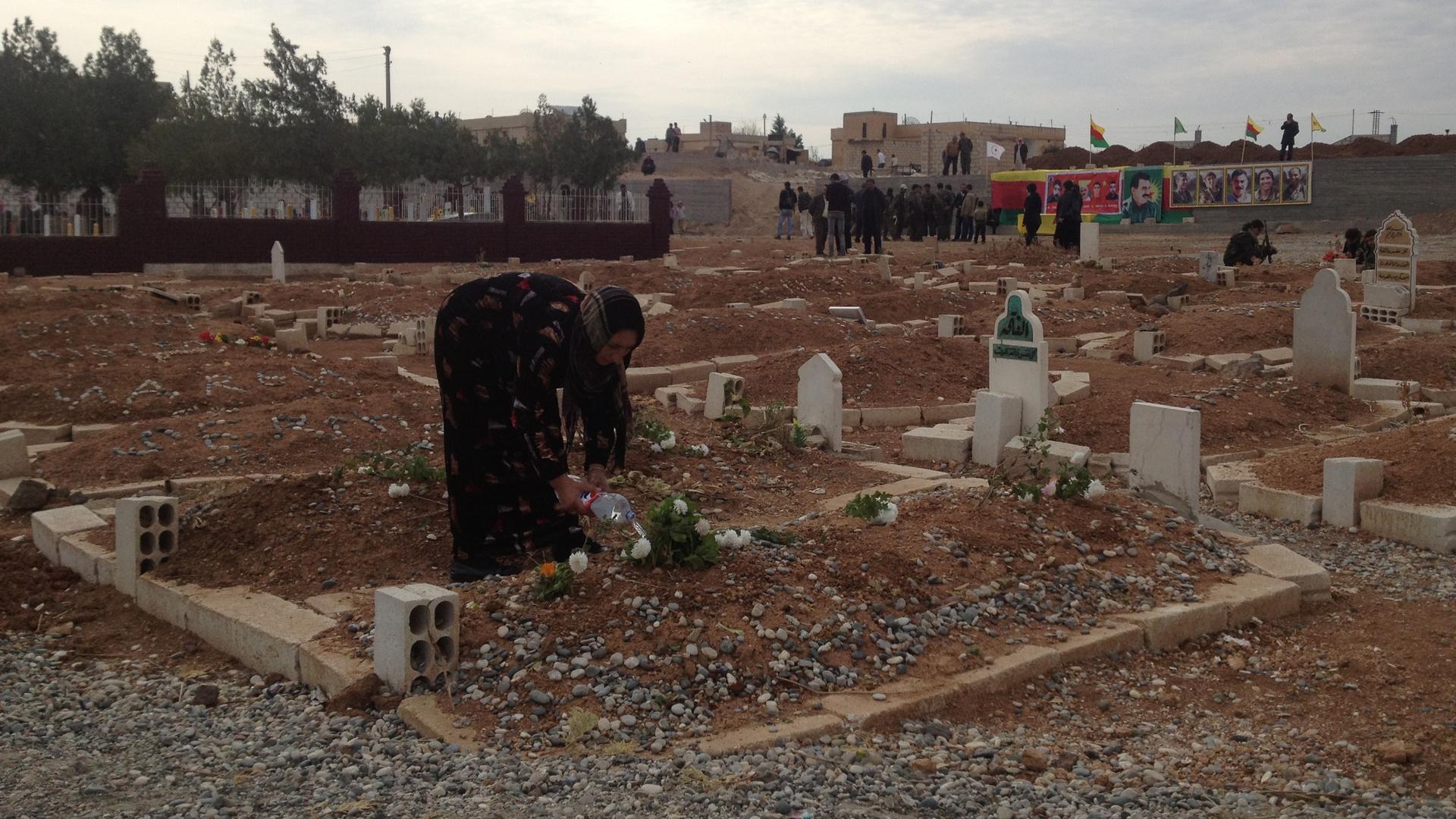In Syria, Kurds are fighting their own war against Islamists, and winning
Kurds call this the “martyr cemetery” in the village of Ray al-Ayn, in northern Syria. Dozens of freshly-covered graves have stretched its boundaries in the last year.
Syria's civil war, going on three years now, is often described as a bloody stalemate. Yet on one particular front, there have been recent breakthroughs.
Two weeks ago in northeastern Syria, Kurdish leaders declared provisional self-rule and created an interim government in a territory controlled by the Kurdish militia. Kurds are the largest ethnic minority in Syria and make up nine percent of the country's population.
The Kurdish militia is slowly pushing out Islamist groups in a region that’s home to most of Syria’s Kurdish population, and to most of the country's oil resources.
As with anything in Syria, though, any progress and peace is still tentative.
There is a frontline, though there’s no exchange of fire and no shelling at the moment. A 20-year-old with a scruffy beard points to the enemy at a distance: al-Qaeda brigades holed up in buildings just a few football fields away.
This man is one of the 50,000 fighters of the YPG, the Kurdish militia in Syria. Like him, most joined the force in the past two years. They’re not really fighting for or against the regime of Bashar al-Assad. They are fighting their own war and their enemy is the Islamist groups that have attempted to take over this largely secular region of Syria. Many of the Islamist groups have come from outside Syria to fight against the Assad regime. Some are linked to al-Qaeda.
The tiny farm the man is guarding was in the grip of al-Qaeda militants until earlier this month.
Abdul Karim Omar is a spokesperson for the People’s Council of Western Kurdistan, a political coalition that backs the YPG.
“YPG, its name, you know, is the units of protecting people, defending, not attacking. All the battles that we took is [sic] in our lands. We didn’t go to Deir Ezzor or Raqqa or Aleppo and attack them. Just we defend our people in our land,” Omar said.
The Kurdish offensive was celebrated by non-Kurdish Syrians, as well, including Arab villagers who’ve turned to the YPG for protection against the Islamists.
Alouk is an Arab village of a hundred or so mud houses surrounded by cotton fields. It’s the last hamlet before Ras al Ayn, a city that had been, for months, at the center of the standoff between Kurds and radical Islamists.
The Nusra Front and the Islamic State in Syria, two al Qaeda-linked groups, stormed Alouk in September and set up their base at its school.
Hassan Mounir al-Shehab, a teacher, remembers the date. It was September 14, just a few days before school was scheduled to start. He says about 300 jihadists spread out around the village at dawn. Hardly any of them spoke Arabic.
“Such people from Malaysia, from Pakistan and Afghanistan have nothing to do with our country. They have nothing to do here except damaging and destroying,” he says.
Al-Shehab and his family fled. They returned recently to a ransacked house. Jihadists had torn the pictures of his grandfather, and taken the eyes out. “The jihadists say it’s a sin to hang portraits on walls,” al-Shehab says. “But they don’t consider what they're doing as sins.”
The YPG drove al-Qaeda out of Alouk a few days later. The village elder says he’s grateful for the help of the Kurdish militia.
“Kurds and Arabs, we are all together in the same trenches. Before this problem, we were already in good terms, but this strengthened our relations even more. The YPG fought to protect us and didn’t want anything in return,” the man said. “I trust them more than my own son.”
After the clashes, some Arab villagers even joined the Kurdish militia. Half a dozen men now man the checkpoint outside of Alouk, most of them Arabs, with Kurdish weapons.
The jihadists retreated, but they’re by no means gone. Over the weekend, three car bombs rocked the Kurdish town of Qamishli. Al-Qaeda fighters planted landmines and set up booby traps when they pulled out of Alouk.
Thirty-year-old Mahmoud was killed a week ago by a booby trap. His funeral turned into a political rally, and a military parade. The day also marked a year since the assassination of Abed Khalil, a journalist and prominent Kurdish activist who was shot by an Islamist sniper.
Khalil was one of the first casualties of this war-within-a-war. Dozens of freshly-covered graves now surround his.
